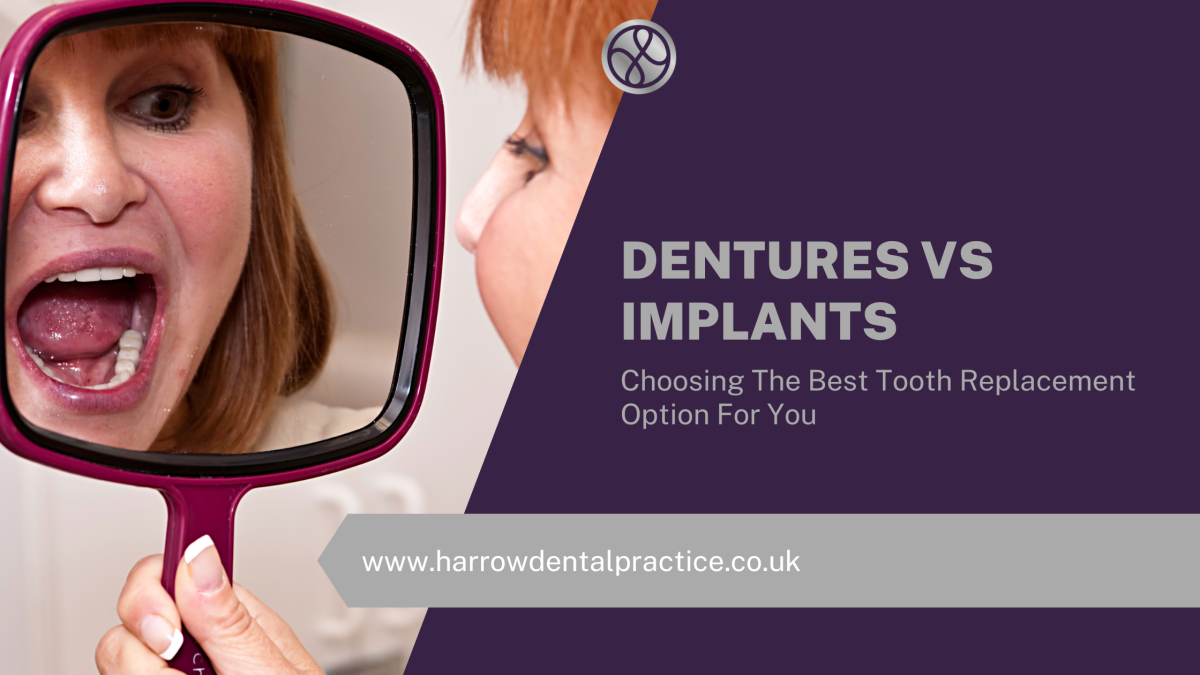Tooth loss is a global problem that affects people of ages and walks of life. It has been estimated that every British adult has at least 6 missing teeth in their mouths – and this number is increasing at an alarming rate. So, with the demand for tooth replacement options increasing in the UK, which option should one select? If you search the internet or ask a dentist, you will find that removable dentures and implants are among the most commonly used options for replacing missing teeth.
But, the next question that may come to your mind would be, “ which is better: implants or dentures?” if you are looking for an answer to this question, you have come to the right place. This blog provides a comparative overview of removable dentures and implants so that you can make an informed decision about replacing your missing teeth. So, continue reading to find out more.
What Are Dental Dentures?
A denture is a removable appliance used to replace one or more teeth. Removable dentures gain support from adjacent healthy teeth, underlying soft tissues, and jaw bones. A denture that replaces one or more teeth is called a partial denture. These dentures possess metallic extensions called clasps that encircle the supporting teeth and provide retention. On the other hand, dentures used to replace all missing teeth in a jaw are called complete dentures. These dentures rely solely on the underlying soft tissue and jawbone contour for their retention and support.
What Is The Difference Between Dental Implants And Dentures?
As discussed earlier, a denture is a removable appliance that rests on the oral soft tissues and jawbone, gains support from the neighbouring teeth, and is used for tooth replacement. On the other hand, an implant is a screw-shaped fixture inserted directly into the jawbone like natural teeth, and it serves as a replacement root. Once the implant becomes fully anchored in the bone, a suitable prosthesis is attached to complete the artificial tooth structure. So, the main difference between a denture and an implant is that one is a removable prosthesis while the other remains fixed within the bone.
Are Dentures Better Or Worse Than Implants?
Removable dentures are a time-tested and cost-effective option for replacing missing teeth. However, they also possess certain drawbacks compared to implants. For example, removable dentures do not restore sufficient chewing and speech efficiency compared to implants. Similarly, dentures have a limited lifespan and can break easily if dropped. Finally, materials leaching out of dentures may cause allergies or other adverse reactions. Hence, implant-supported teeth are better and longer-lasting than dentures.
Why Would Someone Choose Dentures Over Bridges Or Implants?
When choosing between implants and dentures, dental implants are an obvious choice. However, there are two instances when one may have to go for dentures instead of implants. First, when one is not eligible to get implants, such as those with a history of cancer radiotherapy in the region or bisphosphonate use. The second case is when one cannot afford the higher cost of implant therapy. Other than that, dental implants are always the first choice whenever tooth replacement is considered.
What’s Better, Dental Implant Or a Partial Denture?
If you are looking for a tooth replacement option for one or more missing natural teeth, dental implants are the best option. Why? Because they are durable, safe, and restore one’s ability to eat and speak without difficulty. In fact, dental implants can be regarded as the next best thing to one’s own teeth. So, when choosing between a partial denture or an implant-supported prosthesis, dental implants should always be your first choice.
Are Dental Implants The Same As Bridges And Dentures?
No. Although the function of dental implants is the same as bridges and dentures – to replace missing teeth – implants work differently. Removable dentures rest on oral tissues and gain support from the adjacent teeth. Similarly, bridges are fixed prostheses that derive support from adjacent healthy teeth. On the other hand, dental implants are embedded into the jawbone like natural teeth. Hence, they offer the best aesthetics and function among all tooth replacement options.
What Are The Pros And Cons Of Snap-On Dentures?
Snap-on dentures are also known as implant-supported dentures. Some of the advantages and disadvantages of these dentures are discussed below.
Pros of Snap-on Dentures
- Excellent esthetics
- Lifelong durability
- Optimal oral hygiene maintenance
- Optimal restoration of one’s ability to eat and speak
Cons of Snap-on Dentures
- High treatment cost
- Extreme surgical skill and precision required for successful tooth replacement with snap-on dentures
Can You Get Implants After Having Dentures For Years?
Technically, it is possible to get implants after having dentures for many years. However, when dentures are worn long-term, they tend to exert pressure on the underlying jawbone and oral tissues, causing bone resorption. As a result, the bone becomes brittle and is insufficient to support the implants. In these cases, dentists have to restore optimal bone volume through bone grafting. So, it is advisable to consider dental implants for long-term tooth replacement.
What Are Implant Retained Dentures?
An implant retained denture is one that is supported by dental implants. Conventionally, removable dentures are supported by the adjacent supporting teeth and the underlying jawbone and tissues. However, implant-retained dentures supported by one or more dental implants, depending on the number of missing teeth.
Are you fed up with your existing dentures and would like to enjoy the comfort and convenience of dental implants? Head on to Harrow Dental Practice in Hornchurch. So, book an appointment today and walk away with a beautiful and lasting smile with implants.

